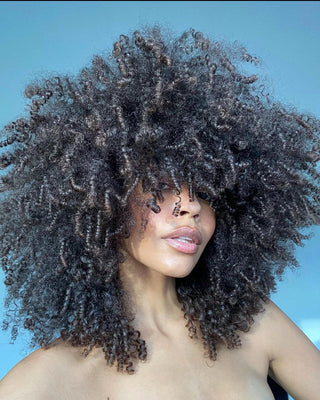As an essential part of your wash day routine, a conditioner replenishes lost moisture from shampooing, reducing frizz and tangles and increasing shine. However, while there are a variety of conditioners to choose from, not all of them are suitable for all curly hair types. This means you might choose a conditioner that causes your curly hair to become dry, brittle, and unmanageable. In this article, we’ll consider what you need to consider before choosing the right conditioner for your dream curls.
Know Your Curly Hair Type
While there are twelve main hair types (straight, wavy, curly, and coily), the latter two are the most important for those with curly hair. Type 3 hair consists of loose curls and compact spirals, while type 4 hair comprises of tinier coils and a bendy zig-zag shape. Whether you have curly or coily hair, both will need moisture. So, you will need a moisturising conditioner to help reduce frizz and seal moisture after drying your hair. These curl types will also require heavier styling products to replenish moisture between wash days.

Be Aware Of Your Curl’s Porosity
In addition to your curl type, choosing the best conditioner for your curly hair depends on its porosity. Low-porosity curls with tight, flat cuticles tend to repel water. This means that if you use heavier products, most of the product will sit on the top of your curls rather than being absorbed. Instead, these curls need a lightweight conditioner, so your natural hair is not weighed down.
On the other hand, high-porosity curls can absorb all the moisture it receives as it possesses open, raised cuticles that will benefit from using rich butters, heavier oils, and more protein to keep them moisturised. If you aren’t sure of your hair’s porosity, click here to learn how to determine your porosity.
Buy A Conditioner In Line With Your Hair’s Current State
It’s very likely that, over a period of time, your curly hair will develop a range of textures that goes beyond a curl type. For example, your curls could become dry and damaged due to excessive chemical treatments. The easiest way to find a solution to an altered hair pattern is this: choose a shampoo based on the condition of your scalp and a conditioner based on the standard of your ends.

If you have to deal with dry ends and a dry scalp regularly, you need our Hydration Shampoo and Moisture-Rich Conditioner. While our shampoo can remove product build-up and nourish your scalp, our conditioner can seal the moisture in from your wash day routine and improve the shine and volume of your curls. Dry hair can also benefit from a deep conditioner when used once or twice a month. Lastly, those with type 4 curls will benefit from our Leave-In Conditioner With Manuka Honey and Avocado Oil. This is because our leave-in can improve the smoothness of your curls. More importantly, it can also reduce split ends which can occur when your curly hair lacks enough moisture.
Alternatively, those with oily or limp ends need to stay away from conditioners with hydrating or smoothing properties, as these products contain a lot of moisture. Instead, it is best to opt for a conditioner that is promoted as strengthening, balancing, or volumizing, as these products do not contain a lot of moisture and will not add excess oil to your curls.

Consider The Ingredients List Before Your Purchase
Most conditioners will contain oils so that your curls can benefit from ‘slip’ when washing them. This ‘slip’ let’s your curls avoid breakage when detangling in the shower. However, if you have low-porosity hair, you need a conditioner with lightweight oils like avocado, jojoba, or grapeseed, as they won’t leave your curls greasy. Meanwhile, high-porosity hair will benefit from heavier oils like coconut and castor as these curls continually crave moisture.
You also need to look at the ingredients list for the occurrence of ‘hydrolyzed’, amino acids, or protein, especially if they are higher on the list. Unless your curls are damaged, you should avoid using a conditioner with protein regularly and instead use it once or twice a month.
Picking the right conditioner for your curls can help you achieve healthier, better-looking curls. Our guide will help you wade through the myriad of options so that you can choose the best conditioner for your curl type, porosity, dryness, or damage levels.

